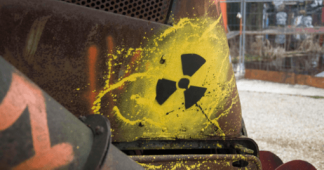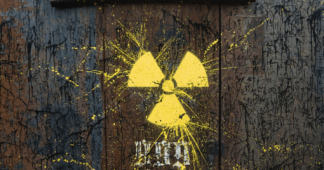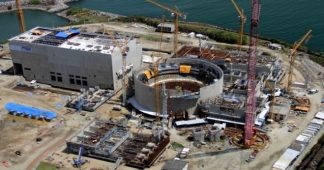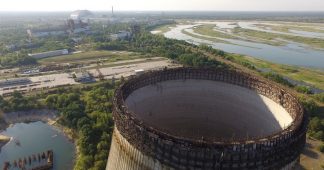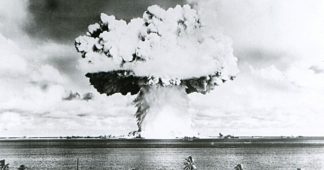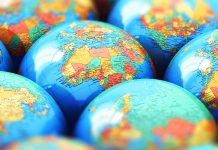By Michael Welch, Dr. Helen Caldicott, and Arnie Gundersen
Global Research, March 17, 2019
The unleashed power of the atom has changed everything save our modes of thinking and we thus drift toward unparalleled catastrophe.”
– Albert Einstein
The eight year old Fukushima Daiichi nuclear disaster marks a critical turning point in human history.
As of November 2018, 18,434 people are known to have died from the March 11, 2011 earthquake and the follow-up tsunami which struck the nuclear facility leading to the inundation of electric generators powering the circulation of coolant in the reactors. When the generators failed, three units experienced catastrophic meltdowns. [1]
Radioactive water has for years now been draining into the Pacific Ocean. Toxic debris spewed into the Earth’s atmosphere. More than 73,000 people remain evacuated, and fully 3,600 dies of illness from causes like illness and suicide linked to the aftermath of the event. [2]
LISTEN TO THE SHOW
Click to download the audio (MP3 format)
The group Simplyinfo.org has been undertaking extensive ongoing research and analysis of the Fukushima disaster and its aftereffects. In its recently released annual report, Simplyinfo presented a number of astonishing and grim revelations.
The report estimated the threat of radioactive microparticles created by the meltdowns as possibly “the single largest ongoing risk to public health from the Fukushima disaster.” According to the research, these pieces of material from the nuclear fuel meltdowns are small enough to be inhaled or ingested and lodge in major organs of the human body where they continually irradiate cancer-causing levels of radiation, making them much more hazardous than the external sources of radiation being monitored by health authorities. [3]
The report also highlighted startling instances of negligence and cover-up. One notable example was the case of Dr. Shunichi Yamashita. He had downplayed the health risks in public meetings, but was discovered through an internal memo retrieved from an ‘off-site center’ set up as a central commend for the disaster to have warned of ‘a serious possibility of thyroid damage to children in the region.’ [4]
As the radioactive contamination continues to be a concern the Japanese government of Shinzō Abe is inviting the world to visit Tokyo for the 2020 Olympics. The authorities are maintaining that the situation has been contained. Officials have decided to have the city of Fukushima host baseball and softball games, and are even having the iconic torch run start in Fukushima. [5]
Efforts to normalize life in Fukushima 8 years after the meltdowns appear to be successful if trends in media consumption are any indication. Articles marking the anniversary were eclipsed by other breaking stories.[6]
This week’s instalment of the Global Research News Hour strives to impress on our listenership that the Fukushima event, if it does not constitute an extinction level event, it is certainly an ongoing health and environmental hazard deserving of at least a portion of the public attention currently directed to climate change.
Dr. Helen Caldicott appears in the first half hour of our program. She collaborated with other experts to provide a one of a kind volume detailing the medical and ecological costs of the Fukushima catastrophe. She returns to the program to update listeners on what is known about the ongoing health dangers, the lack of transparency around the casualties, and the extent of the suppression and misrepresentation of the truth by the Japanese government, the International Atomic Energy Agency, the World Health Organization and the media.
We next hear from Arnie Gundersen of Fairewinds Energy Education. The nuclear industry watchdog shares his understanding of the spread of nuclear contamination at Fukushima, the Japanese government’s bid to distract the public with heavy investment in and promotion of the 2020 Olympics, and the general tendency of governments and regulators to put the health of the industry above the safety of the public. He also addresses some of the background of the Three Mile Island incident which took place 40 years ago this month in Pennsylvania, near Harrisburg.
Dr. Helen Caldicott is a physician and co-founder of Physicians for Social Responsibility. She is a nominee for the Nobel Peace Prize, the recipient of the 2003 Lannan Prize for Cultural Freedom, and author or editor of several books including Nuclear Madness: What You Can Do (1979), If You Love This Planet: A Plan to Heal The Earth (1992), The New Nuclear Danger: George W. Bush’s Military-Industrial Complex(2001), and Crisis Without End -The Medical and Ecological Consequences of the Fukushima Nuclear Catastrophe (2014).
Arnie Gundersen is one of the directors of Fairewinds Energy Education, an information hub showcasing over 200 videos, numerous podcasts and newsletters detailing relating to nuclear energy and the entire power production paradigm. Gundersen is a nuclear engineer with over 45 years of experience in the industry. He holds a nuclear safety patent, was a licensed reactor operator, and has coordinated projects at 70 nuclear power plants in the US. He co-authored with Maggie Gundersen and barrister Reiko Okazaki the 2012 book Fukushima Daiichi: Truth And The Way Forward, which became a Japanese best-seller. His organization’s website is fairewinds.org.
(Global Research News Hour Episode 252)
LISTEN TO THE SHOW
Click to download the audio (MP3 format)
The Global Research News Hour airs every Friday at 1pm CT on CKUW 95.9FM in Winnipeg. The programme is also podcast at globalresearch.ca . Excerpts of the show have begun airing on Rabble Radio and appear as podcasts at rabble.ca.
The Global Research News Hour now airs Fridays at 6pm PST, 8pm CST and 9pm EST on Alternative Current Radio (alternativecurrentradio.com)
Community Radio Stations carrying the Global Research News Hour:
CHLY 101.7fm in Nanaimo, B.C – Thursdays at 1pm PT
Boston College Radio WZBC 90.3FM NEWTONS during the Truth and Justice Radio Programming slot -Sundays at 7am ET.
Port Perry Radio in Port Perry, Ontario –1 Thursdays at 1pm ET
Burnaby Radio Station CJSF out of Simon Fraser University. 90.1FM to most of Greater Vancouver, from Langley to Point Grey and from the North Shore to the US Border.
It is also available on 93.9 FM cable in the communities of SFU, Burnaby, New Westminister, Coquitlam, Port Coquitlam, Port Moody, Surrey and Delta, in British Columbia, Canada. – Tune in at its new time – Wednesdays at 4pm PT.
Radio station CFUV 101.9FM based at the University of Victoria airs the Global Research News Hour every Sunday from 7 to 8am PT.
CORTES COMMUNITY RADIO CKTZ 89.5 out of Manson’s Landing, B.C airs the show Tuesday mornings at 10am Pacific time.
Cowichan Valley Community Radio CICV 98.7 FM serving the Cowichan Lake area of Vancouver Island, BC airs the program Thursdays at 6am pacific time.
Campus and community radio CFMH 107.3fm in Saint John, N.B. airs the Global Research News Hour Fridays at 10am.
Caper Radio CJBU 107.3FM in Sydney, Cape Breton, Nova Scotia airs the Global Research News Hour starting Wednesday Morning from 8:00 to 9:00am. Find more details at www.caperradio.ca
RIOT RADIO, the visual radio station based out of Durham College in Oshawa, Ontario has begun airing the Global Research News Hour on an occasional basis. Tune in at dcstudentsinc.ca/services/riot-radio/
Radio Fanshawe: Fanshawe’s 106.9 The X (CIXX-FM) out of London, Ontario airs the Global Research News Hour Sundays at 6am with an encore at 4pm.
Los Angeles, California based Thepowerofvoices.com airs the Global Research News Hour every Monday from 6-7pm Pacific time.
Notes:
- https://www.thejournal.ie/thyroid-cancer-fukushima-nuclear-4364292-Dec2018/
- ibid
- ‘2019 Annual Report: Fukushima 8th Anniversary’, Simply Info, March 2019, (p.1) http://www.fukuleaks.org/web/wp-content/uploads/2019/03/SimplyInfoOrg_2019_annual_report_Fukushima_finalc.pdf
- op. cit. p.18
- https://www.nbcnews.com/news/world/fukushima-host-olympic-baseball-softball-tokyo-2020-games-n734796
- For example, the Guardian published a story related to the Fukushima anniversary the same day as the story of the Ethiopian Boeing disaster. The Fukushima story got 756 times as opposed to the plane story’s 21 thousand shares on social media. https://www.theguardian.com/world/2019/mar/10/ethiopian-airlines-says-kenya-flight-with-157-onboard-has-crashed
